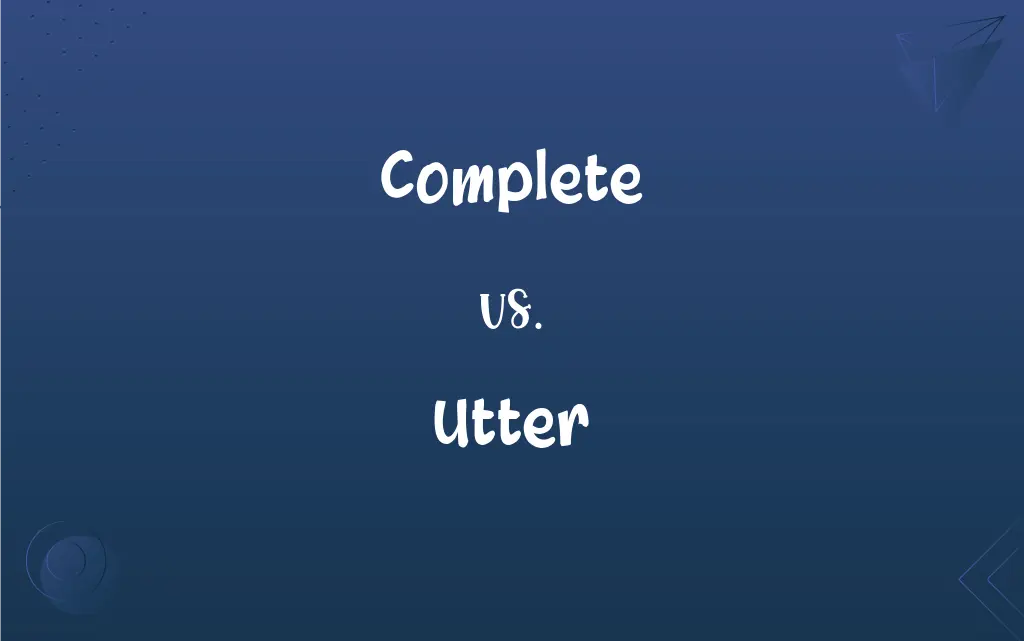Complete vs. Utter: What's the Difference?
By Janet White || Published on January 30, 2024
'Complete' refers to something fully finished or whole, while 'utter' is an intensifier emphasizing absoluteness or extremeness.

Key Differences
'Complete' describes a state where nothing is missing or left out, indicating totality or wholeness. 'Utter' is used to emphasize the total or absolute nature of something, often paired with adjectives.
In usage, 'complete' often pertains to the finished state of tasks, projects, or objects. 'Utter', however, is typically used to modify adjectives, such as 'utter joy' or 'utter despair', conveying an extreme degree.
The word 'complete' can be used in various contexts, from physical completeness to abstract, like completing a thought. 'Utter' adds intensity to a description, stressing an absolute state or condition.
'Complete' is often objective, describing a measurable or observable state. In contrast, 'utter' is more subjective, expressing the speaker's perception of intensity or extremity.
'Complete' can also imply finality, as in a process or development that has reached its end. 'Utter' does not suggest finality but rather an extreme degree of the quality it modifies.
ADVERTISEMENT
Comparison Chart
Meaning
Fully finished or whole; nothing missing.
An intensifier for absoluteness or extremeness.
Usage
Describes the state of being finished or whole.
Modifies adjectives to express extremity.
Contexts
Varied, from physical completion to abstract.
Used with adjectives to emphasize intensity.
Subjectivity
Often objective and measurable.
Subjective, based on the speaker's perception.
Implication
Suggests finality or entirety.
Indicates an extreme degree of a quality.
ADVERTISEMENT
Complete and Utter Definitions
Complete
Finished; ended; concluded.
The project was complete ahead of schedule.
Utter
Absolute; total.
It was an utter disaster.
Complete
Total; absolute.
Her victory was a complete surprise to everyone.
Utter
Complete; unqualified.
The play was an utter success.
Complete
Having all parts or elements; lacking nothing.
The puzzle is complete with every piece in place.
Utter
Emit (a sound) audibly.
The bird uttered a loud chirp.
Complete
Whole; entire; full.
The book offers a complete guide to gardening.
Utter
To speak or say something.
He didn't utter a single word during the meeting.
Complete
To make whole or perfect.
She completed her degree last year.
Utter
Express audibly; articulate.
She uttered a sigh of relief.
Complete
Having all necessary or normal parts, components, or steps; entire
A complete medical history.
A complete set of dishes.
Utter
To send forth with the voice
Uttered a cry.
FAQs
Does 'complete' imply perfection?
Not necessarily perfection, but it implies nothing is missing.
Can 'complete' be used as a verb?
Yes, 'complete' can be a verb meaning to finish making or doing.
Is 'utter' always used as an intensifier?
Often, but it can also mean to express something in speech.
Can 'utter' stand alone as an adjective?
Usually, 'utter' is used before another adjective for emphasis.
Does 'complete' always mean finished?
Generally, yes, it indicates that something is fully done.
Can 'utter' modify nouns directly?
No, it typically modifies adjectives, not nouns.
Does 'utter' have a verb form?
Yes, 'utter' can be a verb meaning to express or articulate.
Is 'utter' used in formal writing?
It can be, but it's more common in expressive or descriptive contexts.
Can 'utter' be used as a noun?
No, 'utter' is not commonly used as a noun.
Is 'complete' used in academic settings?
Yes, 'complete' is often used in academic contexts.
Is 'complete' subjective?
'Complete' is more objective, describing a discernible state.
Are there synonyms for 'complete' that imply incompleteness?
No, synonyms for 'complete' typically suggest fullness or entirety.
Can 'complete' describe a process?
Yes, it can refer to the finishing of a process.
Can 'utter' intensify any adjective?
Almost any, particularly those expressing quality or degree.
Can 'utter' be used in legal contexts?
As a verb, yes, particularly regarding the utterance of statements.
Is 'utter' a common word in everyday speech?
Yes, especially in expressions of strong emotion or emphasis.
Does 'complete' have an opposite?
Yes, its opposite can be 'incomplete' or 'partial'.
Is 'complete' used in mathematics?
Yes, it's used to describe sets or systems that are whole.
Does 'complete' apply to physical objects only?
No, it can apply to abstract concepts like tasks or thoughts.
Can 'utter' express a positive extreme?
Yes, it can express both positive and negative extremes.
About Author
Written by
Janet WhiteJanet White has been an esteemed writer and blogger for Difference Wiki. Holding a Master's degree in Science and Medical Journalism from the prestigious Boston University, she has consistently demonstrated her expertise and passion for her field. When she's not immersed in her work, Janet relishes her time exercising, delving into a good book, and cherishing moments with friends and family.







































































